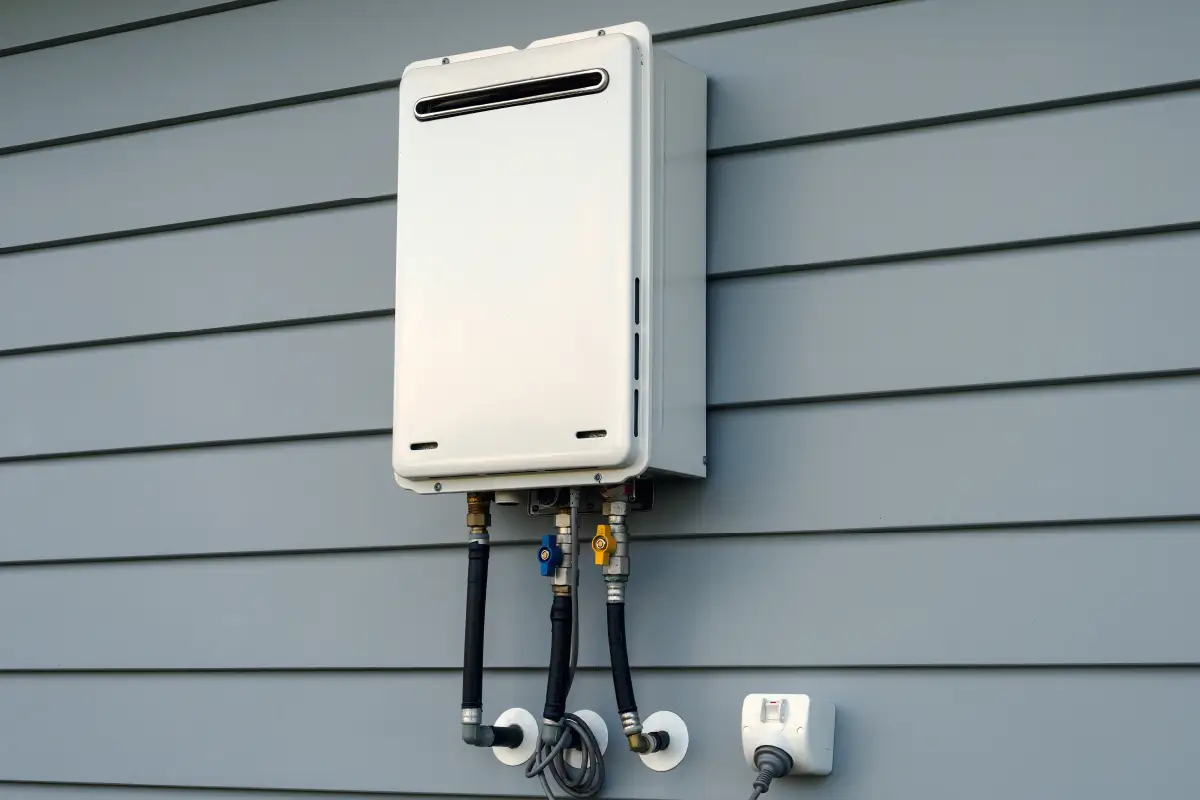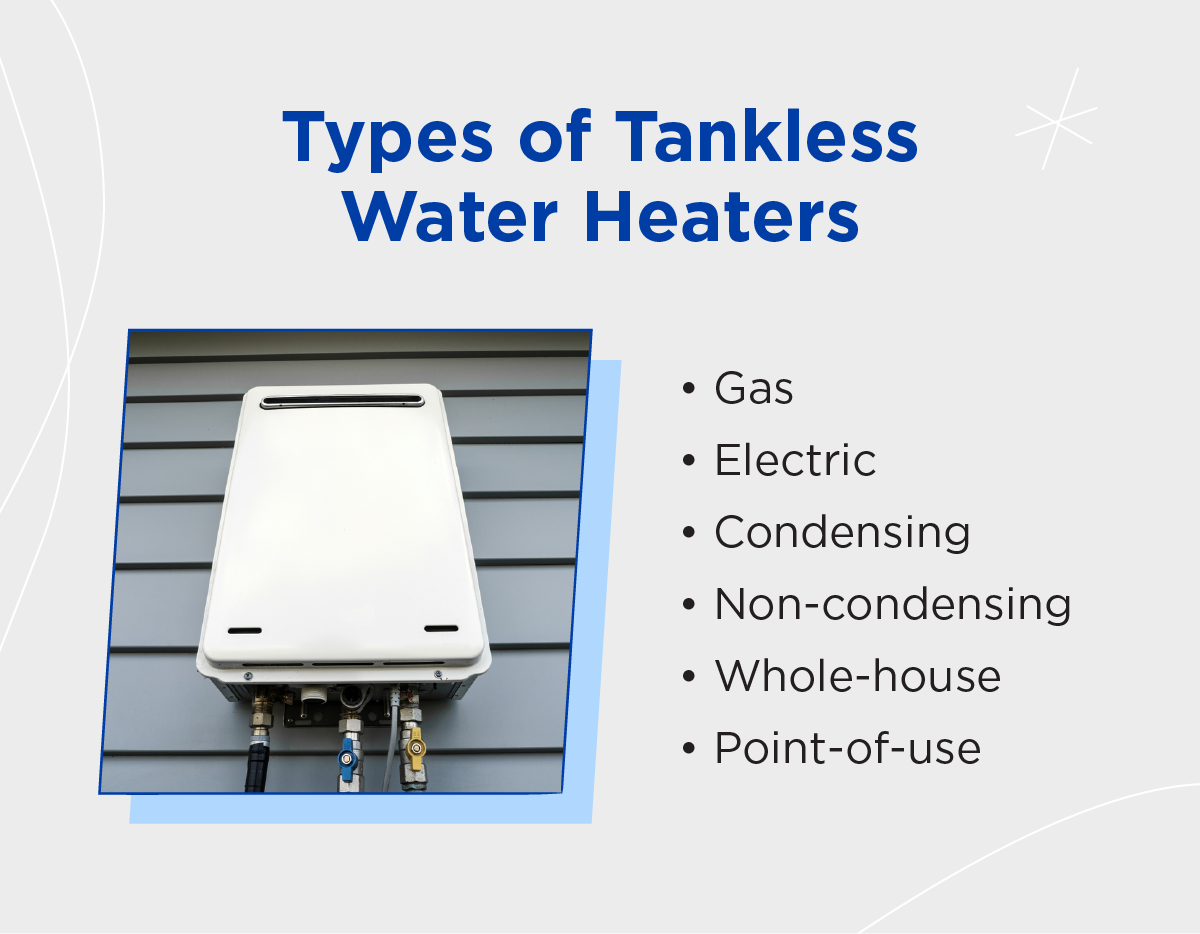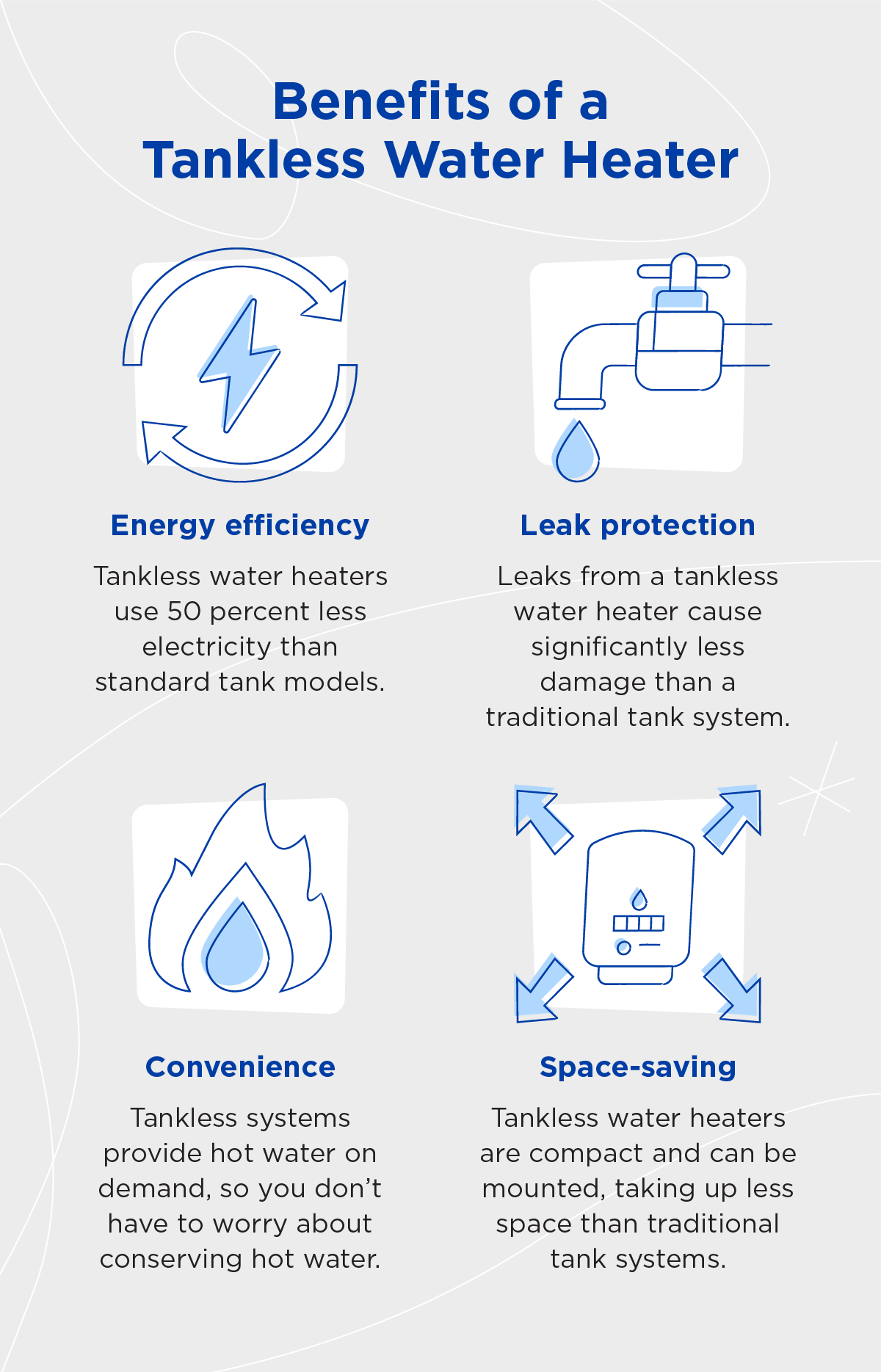
A tankless water heater provides hot water on demand and is a great alternative to traditional tank systems. This type of unit is significantly smaller than a tank water heater and only heats water as needed instead of holding gallons of water in a tank and reheating it over and over.
If you’ve ever experienced the rude awakening of taking a hot shower that suddenly turns cold, you’re not alone. If you’re tired of running out of hot water at the worst possible time (is there ever a good time?), or you’re looking for a more compact and energy-efficient way to get hot water, a tankless system is a great option.
Below, we’ll cover how tankless water heaters work, the pros and cons of tankless water heaters, and how to decide if a tankless system is the right option for your household.
How Does a Tankless Water Heater Work?
A tankless water heater puts out hot water instantly but only heats it once you turn a water source on, like flipping a faucet or running a cycle on a washing machine. Once the water is turned on, cold water passes through a heat exchanger, which draws heat from a natural gas burner or an electrical component.
This is a completely different process from tank-based water heaters, which continuously heat the water stored in its tank even if no water is running. Since tankless systems don’t require continuous heating, they use significantly less electricity. According to the U.S. Department of Energy, tankless water heaters are 24 to 34% more energy efficient for homes using less than 41 gallons of hot water daily.
Types of Tankless Water Heaters

Knowing the types of tankless water heaters makes it easier to understand the system best suited for your household. Here are the different types of tankless water heaters you might consider:
Gas vs. electric
As mentioned, tankless water heaters use gas or electricity to heat water. Gas-powered systems rely on natural gas or propane to heat the water as it passes through the heat exchanger. These units are generally more energy efficient but require more maintenance to prevent mineral buildup and may be more expensive to install.
Electric tankless water heaters use electrical heating elements to heat the water as it passes through the unit. Installation is usually less expensive than gas-powered units, but operating costs can be higher since they require a lot of electricity.
Condensing vs. non-condensing
There are two types of gas-powered tankless water heaters: condensing and non-condensing. The main difference between the two is how they utilize heat.
Condensing tankless water heaters use a secondary heat exchanger to capture the extra gas that’s used to heat the water. While the leftover heat usually travels out of a vent, condensing tankless water heaters reuse that extra heat to heat the water further. This makes them more energy efficient.
Non-condensing tankless water heaters heat the water, and then the excess heat and exhaust gasses escape through an outdoor vent. Though less efficient than a condensing model, non-condensing water heaters usually have lower upfront costs.
Whole-house vs. point-of-use
Whole-house systems, also known as centralized tankless water heaters, are designed to supply hot water to a whole home. So, they’re used to heat water to different appliances and water outlets, like showers, dishwashers, and washing machines. These types of systems can either be gas or electric.
Though whole-house systems can supply hot water to multiple outlets, they’re unable to supply hot water to multiple sources simultaneously. For example, if you take a shower, run the dishwasher, and do a load of laundry at the same time, your system likely won’t produce the same hot water output, leading to a less-than-ideal water temperature.
Because of this, many homeowners (especially those with a higher hot water demand) opt for multiple point-of-use heaters. Point-of-use systems supply hot water to a maximum of two water outlets. They’re more compact than whole-house models and can be installed closer to the water outlet, like under a kitchen or bathroom sink.
Due to the proximity to the water source, they can quickly supply hot water, whereas whole-house systems may experience lag time if the system is installed far away from the given output.
Benefits of Tankless Water Heaters
When selecting a water heater, it's important to weigh the pros and cons of tankless vs. traditional water heaters.

Here are a few benefits of tankless water heaters:
- Energy efficiency: Without a storage tank that needs constant reheating, you’ll find that tankless water heater energy savings are significant. While tankless models may cost a little more upfront, the monthly energy savings will offset the slightly higher purchase price, saving you more money in the long run.
- Leak protection: A tankless system is a recirculating pump, so it doesn’t hold massive amounts of water like a traditional tank. So if your tankless water heater leaks, which is rare, it would cause minimal water damage, unlike a ruptured hot water tank that can hold up to 60 gallons of water.
- Convenience: With a tankless system, you’ll have all the hot water you need right when you need it. No more staggering family showers or delays starting the dishwasher or laundry to conserve hot water.
- Space-saving: Since many tankless water heaters can be mounted on a wall, they take up less space than traditional tank systems. This means they can be installed closer to their points of use and virtually anywhere around your house.
Should I Get a Tankless Water Heater? 6 Things To Consider
If you’re still not sure if a tankless water heater is the right choice for your home, consider the following factors:
- Energy efficiency: If energy efficiency is a priority for you, a tankless water heater is a better choice, as they often use up to 50 percent less electricity than standard tank models.
- Hot water output: Are you sick of running out of hot water when everyone in the house needs a shower? Because whole-house tankless systems can’t heat multiple fixtures simultaneously, point-of-use tankless water heaters can eliminate this problem and supply sufficient hot water temperatures at any given output.
- Financial investment: Are you ready to invest in a more efficient and convenient system, even if it means replacing your old tank system? Though the upfront costs might be higher, you’ll save on monthly utility bills.
- Maintenance: Tankless water heater maintenance is crucial to ensure their long lifespan. Though you'll only need to conduct maintenance every six months to two years, make sure you’re prepared for the task.
- Space: Looking to free up space in your garage or utility room where your tank system currently lives? Since tankless water heaters don’t require a tank, they’re much more compact than traditional systems.
- Installation service: Do you have a reliable plumbing company on board to help you choose the right model and assist with installation? A plumbing company like Mr. Rooter Plumbing® can help answer any questions and provide exceptional service to ensure the job gets done right.
Get Help With Tankless Water Heater Services
We often take hot water for granted — until we run out of it. With a tankless system, a lukewarm or cold shower can become a thing of the past. Going tankless will increase your energy efficiency, provide hot water whenever you need it, occupy less space than a tank system, minimize the risk of a flood, and save you money every month on your utility bills.
To learn more about why replacing your traditional tank water heater with a tankless model could be the right choice for your home, contact your local service professionals at Mr. Rooter Plumbing.
Call us or visit us online for more information.
Tankless Water Heater FAQ
Still wondering if a tankless water heater is worth it? Here are answers to some common questions about tankless systems to help lead you to the right decision.
What is the downside of a tankless water heater?
One downside of a tankless water heater is that it’s unable to supply sufficient hot water to multiple sources simultaneously. This is likely only a drawback if you have a large household with a high demand for hot water. However, you can remedy this issue by installing multiple point-of-use water heaters throughout your home.
In addition, the upfront costs are significantly higher than typical tank systems — including the actual cost of the water heater and installation expenses. However, they provide greater savings in the long run.
How much does it cost to convert a water heater to tankless?
The cost of switching from a tank water heater to a tankless water heater can vary depending on the type of water heater you get and the installation cost. For example, a point-of-use tankless water heater will likely cost much less than a whole-house water heater since it only supplies hot water to one area.
Reach out to Mr. Rooter Plumbing to request a job estimate so we can provide you with a more accurate cost range.
How long do tankless water heaters last?
Tankless water heaters can last up to 25 years with proper upkeep and maintenance. This is a significantly longer lifespan than traditional water heaters, which typically last between 10 and 15 years. However, this can vary depending on factors like the type of tankless water heater, the quality of water, its usage, and the level of upkeep.
You can also check your water heater’s warranty for a more accurate estimate of its lifespan and how long it's covered.
How long does it take to install a tankless water heater?
Tankless water heater installation can take anywhere from four to eight hours (sometimes more), depending on the complexity of the job. Replacing your traditional water heater with a tankless system takes a bit longer because it may require new power and water lines as well as new air vents.
It also takes time to properly mount the system in its designated area. Because tankless water heaters require thorough and proper installation, it’s always recommended to hire a professional service team to handle the job.

